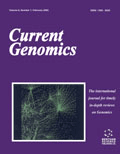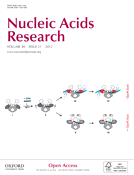
FUNCTIONAL & INTEGRATIVE GENOMICS
Scope & Guideline
Connecting Genomic Research with Real-World Applications
Introduction
Aims and Scopes
- Genomic and Transcriptomic Analysis:
The journal publishes studies that utilize genomic and transcriptomic data to explore gene functions, regulatory mechanisms, and the impact of genetic variations on phenotypic traits. - Integrative Multi-Omics Approaches:
It emphasizes the integration of various omics data (genomics, transcriptomics, proteomics, metabolomics) to gain a comprehensive understanding of biological systems and their interactions. - Focus on Non-Coding RNAs:
Significant attention is dedicated to the roles of non-coding RNAs, including long non-coding RNAs (lncRNAs) and microRNAs, in gene regulation and disease mechanisms. - Molecular Mechanisms in Disease:
Research articles often address the molecular pathways implicated in diseases, particularly cancer, cardiovascular diseases, and metabolic disorders, linking genomic alterations to clinical outcomes. - Application of Advanced Technologies:
The journal showcases innovative methodologies such as CRISPR/Cas9 genome editing, machine learning, and bioinformatics tools used for genomic analysis and therapeutic development.
Trending and Emerging
- Cancer Genomics and Therapeutics:
There is a significant increase in research focusing on the genomic characterization of various cancers and the exploration of therapeutic targets, particularly involving non-coding RNAs and epigenetic modifications. - Machine Learning in Genomics:
The application of machine learning techniques for analyzing genomic data and predicting clinical outcomes is rapidly growing, highlighting a trend towards computational biology and data-driven insights. - Microbiome and Host Interaction Studies:
Research exploring the interactions between host genomes and microbiomes is emerging, indicating a growing interest in understanding the role of microbiota in health and disease. - CRISPR and Genome Editing Applications:
The use of CRISPR technology for genome editing in both model organisms and agricultural species is trending, showcasing its potential for functional genomics and biotechnology. - Long Non-Coding RNAs in Disease Mechanisms:
Studies investigating the roles of long non-coding RNAs in various diseases, particularly cancer and metabolic disorders, are on the rise, reflecting an increased understanding of their regulatory functions.
Declining or Waning
- Traditional Genetic Mapping:
Studies relying solely on conventional genetic mapping techniques are becoming less frequent, as there is a shift towards more integrative approaches that combine genomic data with functional insights. - Basic Phenotypic Characterization:
Research that focuses primarily on basic phenotypic characterization without linking to genomic or molecular data is increasingly being overshadowed by studies that provide deeper functional analyses. - Single-Omics Studies:
There is a noticeable decline in publications focusing on single-omics approaches. Instead, the trend is moving towards multi-omics analyses that provide a more comprehensive view of biological processes. - In Vitro Studies without In Vivo Validation:
Research that does not incorporate in vivo validation of findings is becoming less common, as the emphasis shifts towards studies that demonstrate clinical relevance and applicability. - Descriptive Studies on Gene Functions:
Descriptive studies that merely catalog gene functions without exploring their implications in broader biological contexts are waning, as there is a growing demand for studies that elucidate the functional impacts of genetic variations.
Similar Journals

Frontiers in Genetics
Transforming Genetic Discoveries into SolutionsFrontiers in Genetics is a premier academic journal dedicated to advancing the field of genetics through high-quality, peer-reviewed research. Published by FRONTIERS MEDIA SA in Switzerland since 2010, this Open Access journal provides a platform for researchers and practitioners to disseminate innovative findings across various subfields, including clinical genetics and molecular medicine. With a notable emphasis on interdisciplinary approaches, the journal holds a strong position in the academic landscape, achieving Q2 rankings in key categories such as Genetics and Molecular Medicine in 2023. Not only does Frontiers in Genetics contribute to the scholarly dialogue by publishing impactful studies, but it also promotes accessibility to vital research, ensuring that knowledge is available to a global audience. This journal is a vital resource for researchers, professionals, and students looking to stay at the forefront of genetic discoveries and their applications, reflective of its engagement with contemporary challenges in genetics and healthcare.

International Journal of Genomics
Unlocking the mysteries of life at the molecular level.International Journal of Genomics is a pivotal open-access publication under the esteemed HINDAWI LTD, dedicated to advancing the fields of genomics, biochemistry, genetics, and molecular biology. Established in 2013, this journal aims to disseminate innovative research findings and foster scholarly dialogue among researchers, professionals, and students alike. With a robust Impact Factor reflective of its commitment to quality, the journal has achieved a Q3 ranking in Biochemistry, Genetics, and Molecular Biology, as well as notable placements in Pharmaceutical Science, indicating its broad relevance and influence in these interconnected fields. The journal is indexed in esteemed databases, ensuring high visibility and accessibility for published works. As an open-access journal, it prioritizes the sharing of knowledge across borders, facilitating greater collaboration and advancement in genomic research globally. Join the academic community in exploring the vast potential of genomics through the International Journal of Genomics, based in Egypt, and reaching audiences worldwide from its London office.

CURRENT GENETICS
Connecting Ideas, Transforming GeneticsCURRENT GENETICS is a prestigious journal published by SPRINGER, dedicated to advancing the field of genetics through the dissemination of high-quality research. With a notable impact factor and ranking in the Q2 category for both Genetics and Medicine (miscellaneous) as of 2023, it firmly establishes itself as a significant resource for the academic community. The journal’s comprehensive scope explores the latest findings in genetic research, along with accompanying interdisciplinary studies, providing a platform for researchers to share innovative ideas and methodologies. ISSN: 0172-8083, E-ISSN: 1432-0983, stands testament to its commitment to scholarly excellence. While Open Access options are not currently available, CURRENT GENETICS remains accessible to a broad audience, promoting a rich exchange of knowledge that supports the vast and evolving discipline of genetics. Since its inception in 1979 and through its converged years till 2024, this journal has played a crucial role in confronting scientific challenges and promoting advancements in genomic medicine and molecular biology. As such, it is an essential read for researchers, professionals, and students keen to remain at the forefront of genetic research.

NAR Genomics and Bioinformatics
Unlocking Innovations in Computational BiologyNAR Genomics and Bioinformatics, published by Oxford University Press, is a leading open-access journal that has been at the forefront of research in genomics and computational biology since its inception in 2019. With an impressive impact factor and a consistent ranking in the Q1 category across multiple fields—namely Applied Mathematics, Computer Science Applications, Genetics, Molecular Biology, and Structural Biology—this journal stands as an influential platform for disseminating innovative findings and methodologies. Researchers and professionals have the opportunity to engage with high-quality, peer-reviewed articles that reflect the latest advancements in both theoretical and applied aspects of bioinformatics. The journal's commitment to open access ensures that groundbreaking research is accessible to a global audience, fostering collaboration and knowledge sharing within the scientific community. The country of publication is the United Kingdom, with a dedicated editorial team striving to maintain the highest standards of academic excellence.

CURRENT GENOMICS
Pioneering insights in clinical and molecular genetics.CURRENT GENOMICS is a premier journal published by Bentham Science Publishers that focuses on the expansive field of genomics, including both clinical and molecular genetics. With the ISSN 1389-2029 and E-ISSN 1875-5488, this esteemed journal has been disseminating significant scientific insights since its inception in 2000 and continues to contribute to the field through 2024. Based in the United Arab Emirates, CURRENT GENOMICS boasts a Q3 ranking in both the genetics and clinical genetics categories for 2023, reflecting its growing impact in the scientific community. Although not an open-access journal, it provides valuable content that supports researchers and professionals in navigating the complexities of genetic research and its applications. By publishing original research articles, reviews, and case studies, CURRENT GENOMICS aims to foster a deeper understanding of genomic science and its implications for medicine, thus playing a critical role in the advancement of genetics and biomedical research.

RNA
Advancing the Frontiers of RNA ResearchRNA is a premier journal in the field of molecular biology, published by COLD SPRING HARBOR LAB PRESS, PUBLICATIONS DEPT. With an impressive impact factor reflected by its Q1 status in the Molecular Biology category, this journal has established itself as an essential resource for researchers and professionals dedicated to understanding the role of RNA in biological processes. Spanning over two decades of impactful research from 1995 to 2024, RNA covers a broad spectrum of topics, including RNA biology, gene regulation, and therapeutic innovations. Researchers can access its extensive array of original research articles, reviews, and commentary, making it a vital conduit for new discoveries and methodologies in the field. With its high ranking within Scopus at Rank #115/410 and a 72nd percentile ranking in the domain of Biochemistry, Genetics, and Molecular Biology, RNA continues to advance the understanding of RNA and its critical contributions to life sciences.

BMC Genomic Data
Unlocking insights in genomics and health informatics.BMC Genomic Data is a pioneering open-access journal dedicated to the dynamic field of genomics and health informatics, published by BMC, a renowned leader in scientific publishing based in the United Kingdom. Since its inception in 2021, the journal has established itself as a valuable resource for researchers, professionals, and students, providing a platform for the dissemination of high-quality genomic data research. With a focus on advancing knowledge in both genetics and health informatics, BMC Genomic Data holds a Q3 ranking in both categories as of 2023, indicating its growing influence and relevance in the scientific community. The journal has an impressive entry into the competitive landscape of academia, ranking #55 in the Medicine & Health Informatics category and #173 in Biochemistry, Genetics and Molecular Biology, reflecting its commitment to publishing impactful research. By offering an open-access model, researchers are encouraged to disseminate their findings widely, contributing to the ongoing dialogue in genomics. For those looking to stay at the forefront of genomic research and data analysis, BMC Genomic Data is an essential resource that promotes innovation and collaboration across disciplines.

GENOME BIOLOGY
Unlocking the secrets of genome biology for a brighter future.GENOME BIOLOGY is a premier, peer-reviewed journal published by BMC, focusing on the rapidly evolving fields of genomics, molecular biology, and bioinformatics. Accessible as an Open Access journal since 2000, it aims to disseminate high-quality, cutting-edge research that contributes to our understanding of genome biology's intricate mechanisms. The journal boasts an impressive impact, ranking 8th in Agricultural and Biological Sciences and 9th in Biochemistry, Genetics and Molecular Biology, highlighting its significance among scholars, professionals, and students alike. With a commitment to facilitating the exchange of invaluable scientific knowledge, GENOME BIOLOGY provides an important platform for discussions on evolutionary biology, genetic systems, and cell biology, contributing to the advancement of these dynamic disciplines.

NUCLEIC ACIDS RESEARCH
Catalyzing Innovations in Genetic ResearchNUCLEIC ACIDS RESEARCH, published by Oxford University Press, is a premier peer-reviewed journal in the field of genetics, holding a prestigious Q1 ranking in this domain as of 2023. Since its inception in 1974 and with a converged publication horizon extending to 2024, this journal has established itself as a vital resource for researchers and professionals interested in the molecular aspects of nucleic acids, encompassing DNA and RNA studies as well as their implications in biochemistry and molecular biology. With an impressive Scopus rank of #6 out of 347 in Genetics, this journal is positioned in the 98th percentile among its peers, highlighting its significant impact and relevance in the scientific community. As an open access journal since 2005, NUCLEIC ACIDS RESEARCH ensures wide dissemination of knowledge, promoting collaborative advancements in genetic research. For those looking to stay at the forefront of nucleic acid research, this journal remains an essential publication for accessing cutting-edge findings and innovative methodologies in the field.

JOURNAL OF MOLECULAR MEDICINE-JMM
Championing High-Quality Research in Biomedical Science.JOURNAL OF MOLECULAR MEDICINE (JMM) is a premier publication dedicated to advancing the field of molecular medicine, encompassing critical areas such as drug discovery, genetics, and biochemistry. Published by Springer Heidelberg in Germany, this influential journal has established its significance within the academic community, achieving an impressive Q1 ranking across multiple categories as of 2023, including Drug Discovery, Clinical Genetics, and Molecular Medicine. With a focus on publishing high-quality research and novel insights, JMM appeals to a diverse audience of researchers, professionals, and students passionate about the molecular underpinnings of health and disease. The journal, which has seen a convergence of relevant research spanning from 1976 to 2024, is instrumental in showcasing groundbreaking studies that push the boundaries of knowledge in molecular therapeutics and biomedical science. While it does not offer open access, the rigor of its peer-reviewed content ensures that each publication is a valuable addition to the scientific discourse surrounding molecular medicine. For comprehensive studies and reviews that highlight the intersection of molecular biology and clinical application, look no further than JOURNAL OF MOLECULAR MEDICINE.